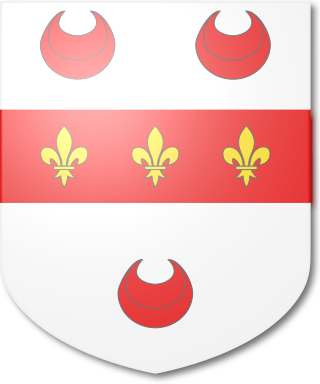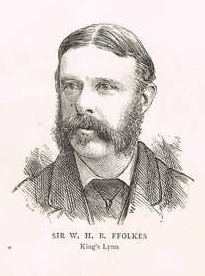
The Eliott Baronetcy, of Stobs in the County of Roxburgh, is a title in the Baronetage of Nova Scotia. It was created on 3 December 1666 for Gilbert Eliott. The second baronet was a member of the pre-union Parliament of Scotland. The third Baronet sat as Member of Parliament for Roxburghshire. The Eliott Baronets share a common early Elliot ancestry with the nearby Earls of Minto (Elliot). It is thought that the surname spelling differences were contrived to differentiate the branches.

The Bunbury Baronetcy, of Bunbury, Oxon and Stanney Hall in the County of Chester, is a title in the Baronetage of England. It was created on 29 June 1681 for Thomas Bunbury, Sheriff of Cheshire from 1673 to 1674 and the member of an ancient Cheshire family. His grandson, Henry, the third Baronet, and great-grandson, the fourth Baronet, both sat as Members of Parliament for Chester. The latter died unmarried at an early age and was succeeded by his younger brother, the fifth Baronet. He was a clergyman. On his death in 1764 the title passed to his eldest son, the sixth Baronet. He represented Suffolk in the House of Commons for over forty years but is best remembered for his marriage to Lady Sarah Lennox. He died childless in 1821 and was succeeded by his nephew, the seventh Baronet. He was the son of Henry Bunbury, younger son of the fifth Baronet. The seventh Baronet was a distinguished soldier and politician. His eldest son, the eighth Baronet, was High Sheriff of Suffolk in 1868, and Fellow of the Royal Society. He died childless in 1886 and was succeeded by his younger brother, the ninth Baronet. He was Liberal Member of Parliament for Bury St Edmunds. He died unmarried in 1895 and was succeeded by his nephew, the tenth Baronet. He was the son of Colonel Henry William St Pierre Bunbury, third son of the seventh Baronet. He served as High Sheriff of Suffolk in 1908 and was a Deputy Lieutenant of the county. On his death in 1930 the title passed to his son, the eleventh Baronet. He was High Sheriff of Suffolk in 1936 and was a Deputy Lieutenant of the county. His son, the twelfth Baronet, was High Sheriff of Suffolk in 1972. As of 2014 the title was held by the latter's second but eldest surviving son, the thirteenth Baronet, who succeeded in 1985.

The Bagge Baronetcy, of Stradsett Hall in the County of Norfolk, is a title in the Baronetage of the United Kingdom. It was created on 13 April 1867 for William Bagge, Conservative Member of Parliament for West Norfolk. The sixth Baronet was Chairman of the West Norfolk District Council between 1976 and 1977.

The Cradock-Hartopp Baronetcy, of Freathby in the County of Leicester and of Four Oaks Hall in the County of Warwick, was a title in the Baronetage of Great Britain. It was created on 12 May 1796 for Edmund Cradock-Hartopp, Member of Parliament for Leicestershire. Born Edmund Bunney, he was the husband of Anne Hurlock, granddaughter and heiress of Sir John Hartopp, 4th Baronet, of Freathby. On his marriage in 1777 he assumed the surname of Cradock-Hartopp in lieu of his patronymic according to the wills of his uncle Joseph Cradock and his wife's grandfather. His eldest surviving son Edmund, the second Baronet, died childless and was succeeded by his younger brother, William, the third Baronet. The title then descended from father to son until the death of his grandson, Charles, the fifth Baronet, in 1929.

There have been two baronetcies created for the Guise family, one in the Baronetage of England and one in the Baronetage of Great Britain. The latter creation is extant as of 2014.

The Broadbent Baronetcy, of Longwood in the Parish of Huddersfield in the West Riding of the County of York, and of Brook Street, in the Parish of St George Hanover Square in the County of London, is a title in the Baronetage of the United Kingdom. It was created on 10 August 1893 for the noted physician William Broadbent. The title descended from father to son until the death of his grandson, the third Baronet, in 1987. The late Baronet was succeeded by his first cousin once removed, the fourth Baronet. He was the grandson of Walter Broadbent, third son of the first Baronet.

The Hogg, later Lindsay-Hogg Baronetcy, of Rotherfield Hall in Rotherfield in the County of Sussex, is a title in the Baronetage of the United Kingdom. It was created on 22 December 1905 for Lindsay Hogg, Conservative Member of Parliament for Eastbourne from 1900 to 1906. He assumed by Royal licence the additional surname of Lindsay before that of Hogg in 1906.

The Lowe Baronetcy, of Edgbaston in the City of Birmingham, is a title in the Baronetage of the United Kingdom. It was created on 30 January 1918 for Francis Lowe, Conservative Member of Parliament for Edgbaston from 1898 to 1929.

The Maclure Baronetcy, of The Home in Whalley Range near Manchester in the County Palatine of Lancaster, is a title in the Baronetage of the United Kingdom. It was created on 12 March 1898 for John William Maclure. He was Secretary of the Famine Relief Fund from 1862 to 1865 and sat as Conservative Member of Parliament for Stretford between 1886 and 1901.

The Oakeley Baronetcy, of Shrewsbury, is a title in the Baronetage of Great Britain. It was created on 5 June 1790 for the Indian administrator Charles Oakeley. He served as Governor of Madras from 1790 to 1794. Frederick Oakeley was the second son of the first Baronet.
The Hartwell Baronetcy, of Dale Hall in the County of Essex, is a title in the Baronetage of the United Kingdom. It was created on 26 October 1805 for Admiral Francis Hartwell.

The Farrington Baronetcy, of Blackheath in the County of Kent, is a title in the Baronetage of the United Kingdom. It was created on 2 December 1818 for General Sir Anthony Farrington, 1st Baronet.

The Winnington Baronetcy, of Stanford Court in the County of Worcester, is a title in the Baronetage of Great Britain.

The Rycroft Baronetcy, of Calton in the County of York, is a title in the Baronetage of Great Britain. It was created on 22 January 1784 for Reverend Richard Rycroft. Born Richard Nelson, he was the only surviving son of John Nelson, and had assumed by Royal sign-manual the surname of Rycroft in lieu of his patronymic in 1758. The fifth Baronet was high sheriff of Hampshire in 1899. The sixth Baronet was high sheriff of Hampshire in 1938.

The Milman Baronetcy, of Levaton-in-Woodland in the County of Devon, is a title in the Baronetage of Great Britain. It was created on 28 November 1800 for Francis Milman, Physician-in-Ordinary to King George III and President of the Royal College of Physicians. The seventh Baronet was a brigadier-general in the British Army.

The Smith, later Smith-Marriott Baronetcy, of Sydling St Nicholas in the County of Dorset, is a title in the Baronetage of Great Britain. It was created on 1 June 1774 for John Smith, High Sheriff of Dorset in 1772. The second Baronet married Elizabeth Anne, daughter of Reverend James Marriott. The fourth Baronet assumed by Royal sign-manual the additional surname of Marriott. The fifth Baronet was High Sheriff of Dorset in 1873.

The Buckworth, later Buckworth-Herne, later Buckworth-Herne-Soame Baronetcy, of Sheen in the County of Surrey, is a title in the Baronetage of England. It was created on 1 April 1697 for John Buckworth, High Sheriff of London in 1704. The second Baronet sat as Member of Parliament for Weobley. The third Baronet was Assistant Gentleman Usher to George II. The fifth Baronet was Gentleman-Pensioner and Exon of the Guard during the reign of George III. He married Anne, daughter of Paston Herne, of Haveringland Hall, Norfolk, and assumed by Royal licence the additional surname of Herne. The sixth Baronet assumed in 1806 by Royal licence the additional surname of Soame in compliance with the will of Sir Peter Soame, 4th Baronet, of Thurlow. The ninth Baronet was a member of the Shropshire County Council.

Sir William Hovell Browne ffolkes, 3rd Baronet was an English Liberal politician who sat in the House of Commons from 1880 to 1885.
The Rev. Sir Francis Arthur Stanley ffolkes, 5th Baronet was an English baronet and Anglican priest who served successive monarchs of the United Kingdom as an Honorary Chaplain and Chaplain-in-Ordinary.

The Green baronetcy, of Wakefield in the County of York, and of Ken Hill in the parish of Snettisham in the County of Norfolk, was created in the Baronetage of the United Kingdom on 5 March 1886 for Edward Green, Conservative Member of Parliament for Wakefield. The second baronet became involved in the Royal Baccarat Scandal of 1890. The fourth Baronet was a deputy lieutenant and high sheriff of Norfolk and was a member of the Norfolk County Council.


















